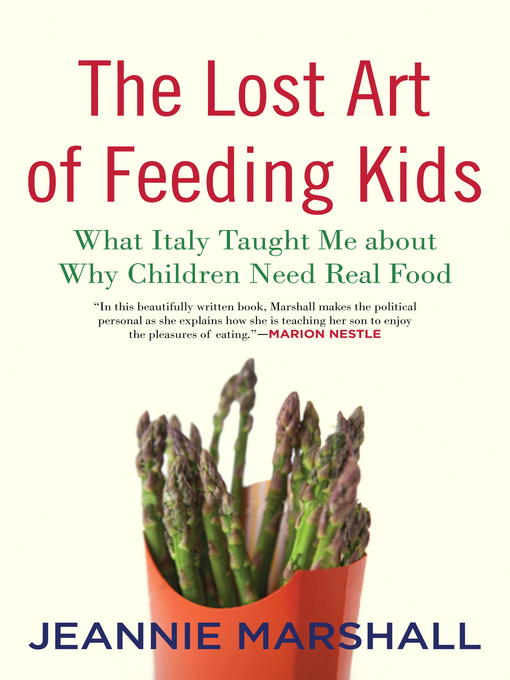
The Lost Art of Feeding Kids
What Italy Taught Me about Why Children Need Real Food
کتاب های مرتبط
- اطلاعات
- نقد و بررسی
- دیدگاه کاربران
نقد و بررسی

October 7, 2013
In this slow food/locavore manifesto with a secondary theme of hand-wringing about feeding children, a Canadian journalist living in Rome shares her experience of trying to feed her baby in the traditional Italian style and segues into an exploration of why European food culture is giving way to Americanized processed, packaged, and industrially produced foods. Marshall wistfully describes shopping in farmer’s markets, feeding her baby a simple brodo with pureed bits of the family’s evening meal, and meeting Italians who wouldn’t dare chomp on a fine pastry on the street. The author laments that Italians are failing to transmit this food culture to the next generation, instead giving their kids bland and convenient baby formulas, sugary cereals, and fast food. She takes large companies like Nestlé and Pepsi to task for philanthropic policies and programs that aim to offer better nutrition to children with whole-grain, lower-fat versions of processed foods, among other issues, disputing their claims that the global poor and malnourished can’t afford a whole foods approach to health. Not only does Marshall see the U.S. exporting obesity and reduced crop diversity, she sees cultural traditions being lost abroad. Though Marshall is not the most evocative writer, nor the most effective advocate, her point that parents need to think about the future when feeding their kids is an important one.

December 15, 2013
Teaching kids "to learn the simple pleasures of the table and to appreciate the taste of real food." The childhood obesity epidemic gets a fair amount of coverage in the American press, often with a slant on how unhealthy eating leaves us less competitive in the global marketplace. The eating habits abroad have shifted as well, however; as American exports of fast food, convenience foods and cooking shortcuts have seeped into other cultures, the health effects have slowly emerged. Journalist Marshall and her husband moved to Italy in the early 2000s and immersed themselves in the food culture. Childless, they were free to indulge in the authentic cuisine of their new home. When the author gave birth to their first child, the family's shopping needs shifted to include an extra mouth to feed. Marshall began to perceive a subtle change--at first slight, with parent-peers still working to incorporate classical traditions in their cooking, but increasingly toward convenience foods as her son started school. The author explores the changes in eating on both a macro and micro level--how global economics has shifted the priority for simple carbohydrates into regions and countries with their own storied cultures and patterns of eating, based off generations of cuisine built around locally produced foods. Marshall also examines the public relations machine that offers a solution for harried mothers and fathers who go into parenting with the best of intentions but find their resolve eroded by a constant message from the food industry to buy cereal bars, crackers, cookies and yogurt and feel satisfied about it--maybe it's organic or doesn't contain high-fructose corn syrup, and it's "packed with nutrients." Marshall's clear, direct book ably captures the frustrations of trying to find the healthiest path and inspiring kids to do the same.
COPYRIGHT(2013) Kirkus Reviews, ALL RIGHTS RESERVED.

























دیدگاه کاربران